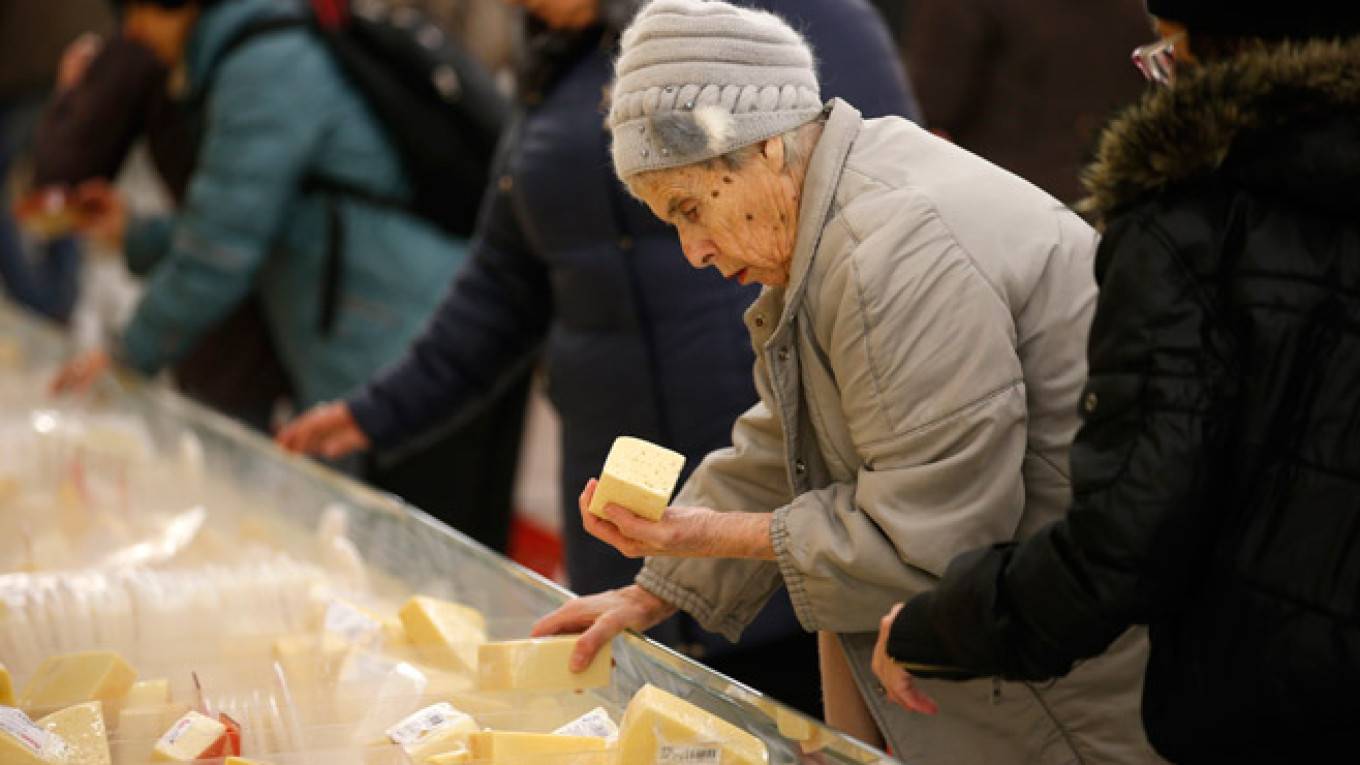?’?»?µ?‚?µ́?‚?? ?? ???????µ́?µ?‡????: to cost a pretty penny
While I was swanning through the produce section of a supermarket the other day, humming a little food tune as I contemplated dinner, a price tag suddenly stopped me dead in my tracks. Cauliflower was selling for 760 rubles a kilogram. I've been watching prices double in recent weeks, but cauliflower?! Plain old, grown-everywhere, easy-to-store cauliflower?! 760 rubles a kilogram! Boy, are we in trouble.
The first thing I did was race home to brush up my ability to describe outrageously skyrocketing prices.
Let's start with how to ask about a price. There's the simple ???????»?????? ???‚?????‚ (how much), or ?????‡?‘??, ???? ???°?????? ?†?µ???µ (how much, often used for things that have a unit cost).
Replies come with several different verbs. ???»?°?‚???µ ???‚?????‚ 12,000 ?€???±?»?µ??. (The dress costs 12,000 rubles.) ???°???????° ???°?? ???±???????‘?‚???? ?? 2 ?????»?»???????° ?€???±?»?µ??. (The car will run you 2 million rubles.) ? ?µ???????‚ ?????‚?°???µ?‚ ?‚?µ?±?µ ?±???»?????µ 10,000 ?€???±?»?µ??. (The repairs will cost you more than 10,000 rubles.) Sometimes people use a phrase with an exact English equivalent: ??‚?° ?????°?€?‚???€?° ?»?µ?????? ???????‘?‚ ?·?° ?????»?»?????? ?±?°????????. (That apartment will easily go for a million bucks.)
Then you need a nice selection of adjectives to appropriately describe the price (?†?µ???°). ?’?‹???????°?? (high) just doesn't cut it. ?? ?±?‹?»?° ???° ?€?‹?????µ, ?? ?†?µ???‹ … (I was at the market and the prices were …): ?°?????????µ (hellish), ?°?…?????‹?µ (yikes!), ?°???‚?€???????????‡?µ???????µ (astronomical) or ?±?µ???µ???‹?µ (insane, literally "rabid").
When I'm sputtering over a price I like to use the word ?±?°?????????»???????‹?? (fabulous), from the word ?±?°?????? (fable or legend). The idea is the prices are the stuff of legends, but not in a good way. ???????‰?? ?‚?µ???µ?€?? ???‚?????‚ ?±?°?????????»???????‹?… ???µ???µ??. (Vegetables these days cost an arm and a leg.) ?”?°, ?????µ?·?????»?? ?? ???????±?‹ ???µ???‘???‹?? ???°???°?·????. ?? ?‚?°?? ?????‘ ?±?°?????????»???????? ?????€??????. (Yes, we went to the so-called cheap store. Even there everything was jaw-droppingly expensive).
In the old days — that is, a few months ago — usually people, advice, recommendations and the like were worth ???° ???µ?? ?·???»???‚?° (their weight in gold). ?•???? ?????„???€???°?†???? ?†?µ?????»?°???? ???° ???µ?? ?·???»???‚?°. (His information was worth its weight in gold.) But now, in the new era, anything can cost as much as a gold necklace. ???…?»?°?¶???‘?????°?? ?€?‹?±?°, ?????‚???€?°?? ?»?µ?¶???‚ ???° ?»??????, ???€?????‚?? ???° ???µ?? ?·???»???‚?°. (Chilled fish on ice is just worth its weight in gold.)
Sometimes things are so expensive you can't even touch them. ?? ???‹?€ — ?? ???‹?€?°?? ???€?????‚?????? ???µ?‚ (As far as cheese goes — you can't even touch it. Literally, "you can't approach it.") Or you can't touch it because the high prices bite. ???°?? ????????????! ???? ?†?µ???‹ ???????°???‚????. (It's really delicious! But the prices take a real bite out of your budget.) Or they burn: ?’ ???‚???? ???????? ?†?µ???‹ ?¶?????‚????. ???µ?€?????‡???‹?? ???€???‘?? ?? ???€?°?‡?° — 3,500 ?€???±?»?µ??. (This year prices are off the charts. The first doctor's visit is 3,500 rubles.)
In English, very expensive things cost a pretty penny. In Russian, they cost a fine little kopek. You have a choice of verbs: ???»?µ?‚?°?‚??/???»?µ?‚?µ?‚?? (to fly); ?????‚?°???°?‚??/?????‚?°?‚?? (to rise); ???‹?…???????‚??/???‹???‚?? (to come out); ???±?…???????‚??????/???±?????‚?????? (to cost) — all of which end with the phrase ?? ???????µ?µ?‡???? (a fine kopek).
???‚???° ???±???????‘?‚???? ?? ???????µ?µ?‡????. (The duck is going to cost you a pretty penny.) ???‚?€?????‚?µ?»?????‚???? ???»?µ?‚???‚ ?? ???????µ?µ?‡????. (Construction costs are going to go through the roof.)
Stay tuned! Next week: ways to express poverty.
Michele A. Berdy, a Moscow-based translator and interpreter, is author of "The Russian Word's Worth" (Glas), a collection of her columns.
A Message from The Moscow Times:
Dear readers,
We are facing unprecedented challenges. Russia's Prosecutor General's Office has designated The Moscow Times as an "undesirable" organization, criminalizing our work and putting our staff at risk of prosecution. This follows our earlier unjust labeling as a "foreign agent."
These actions are direct attempts to silence independent journalism in Russia. The authorities claim our work "discredits the decisions of the Russian leadership." We see things differently: we strive to provide accurate, unbiased reporting on Russia.
We, the journalists of The Moscow Times, refuse to be silenced. But to continue our work, we need your help.
Your support, no matter how small, makes a world of difference. If you can, please support us monthly starting from just $2. It's quick to set up, and every contribution makes a significant impact.
By supporting The Moscow Times, you're defending open, independent journalism in the face of repression. Thank you for standing with us.
Remind me later.


